北师大英语九年级Unit 1 Language Lesson 1 Body Language课件(71张)
文档属性
| 名称 | 北师大英语九年级Unit 1 Language Lesson 1 Body Language课件(71张) |
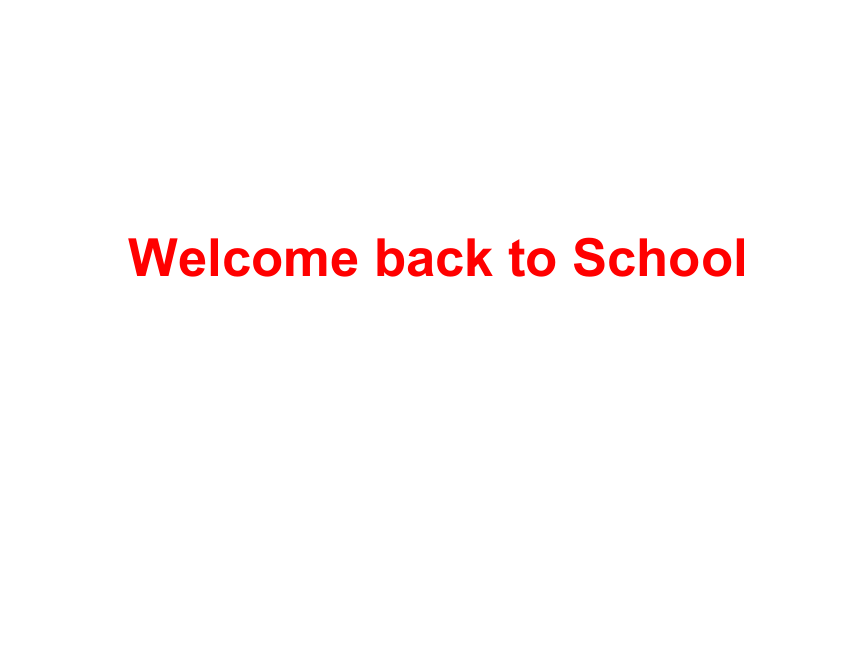
|
|
| 格式 | zip | ||
| 文件大小 | 9.2MB | ||
| 资源类型 | 教案 | ||
| 版本资源 | 北师大版 | ||
| 科目 | 英语 | ||
| 更新时间 | 2018-08-30 15:03:53 | ||
图片预览

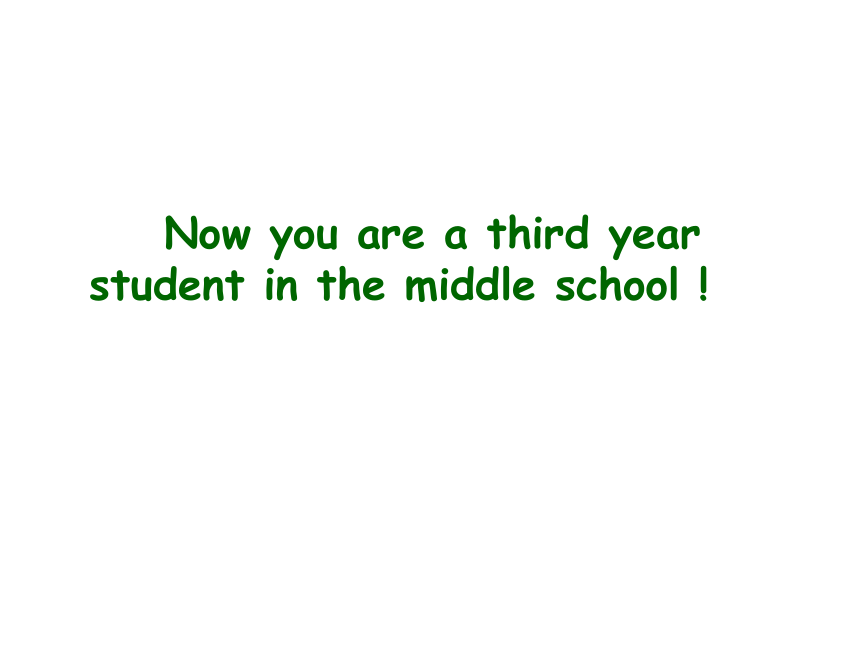



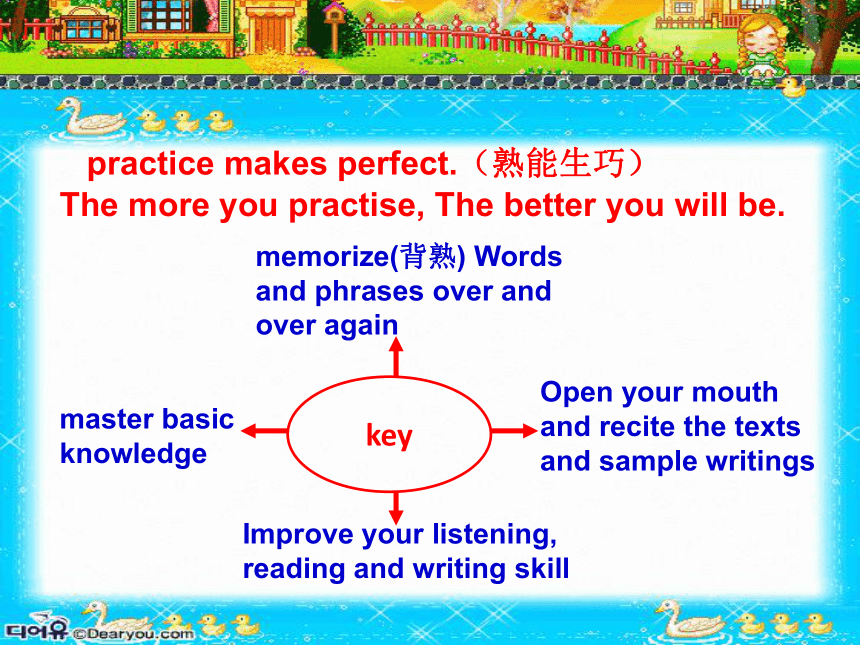
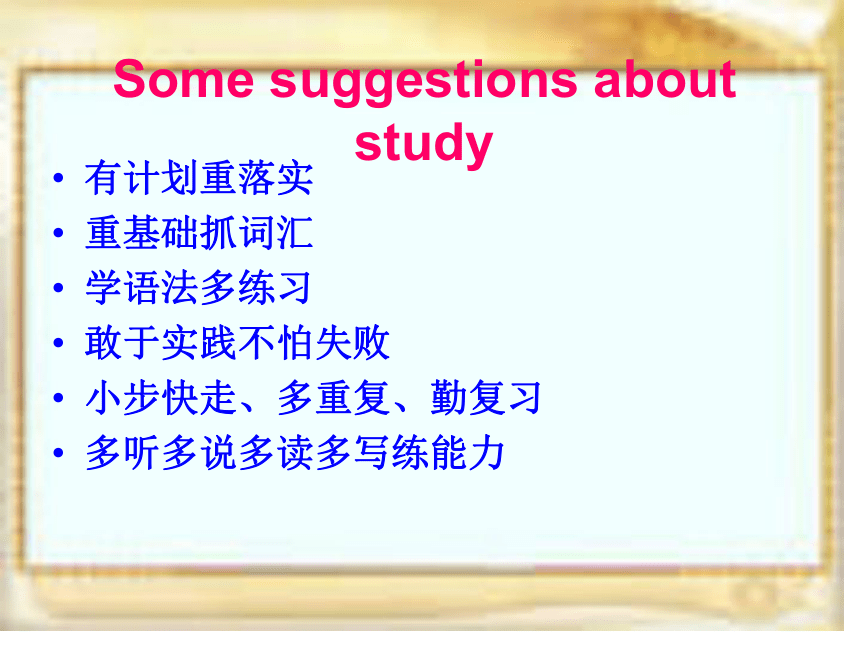
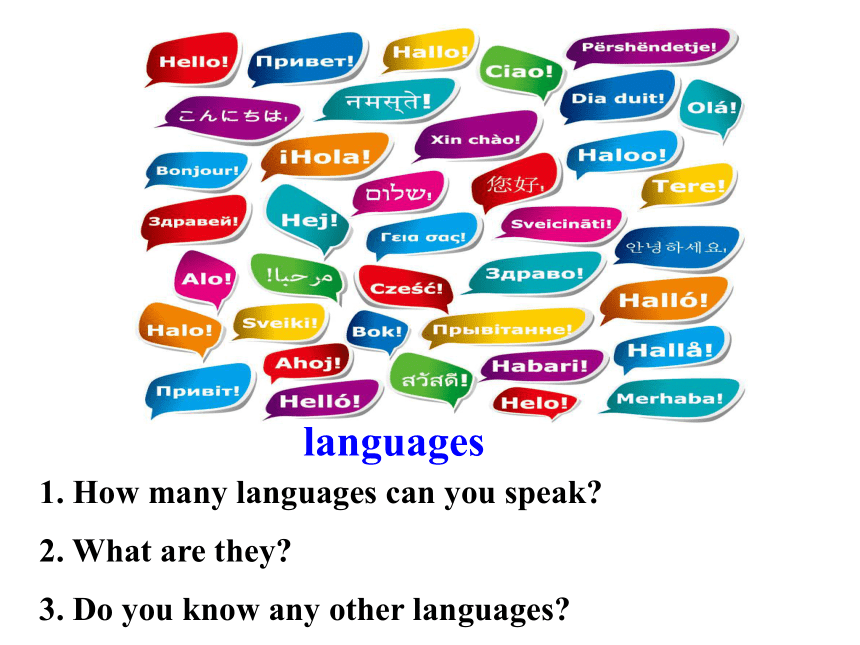
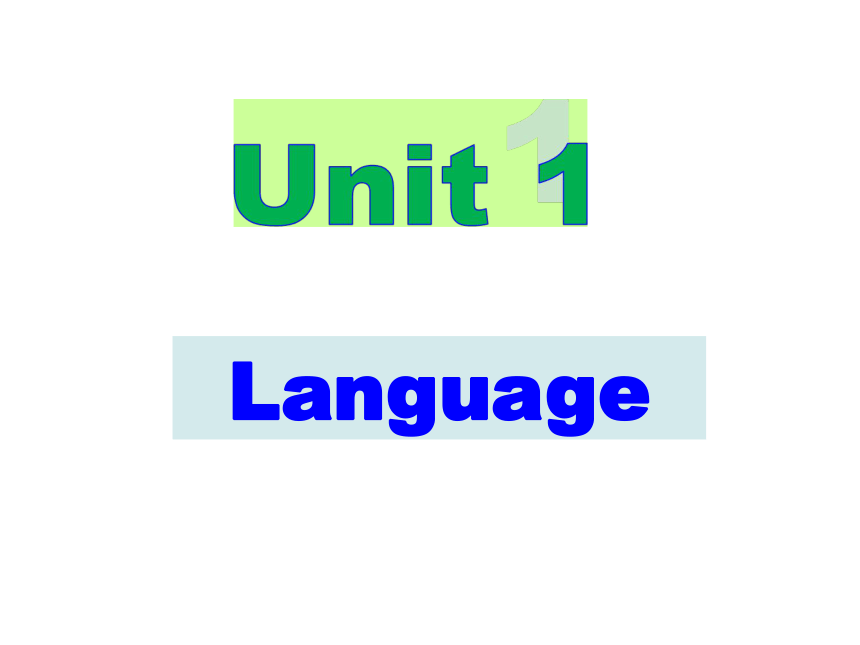
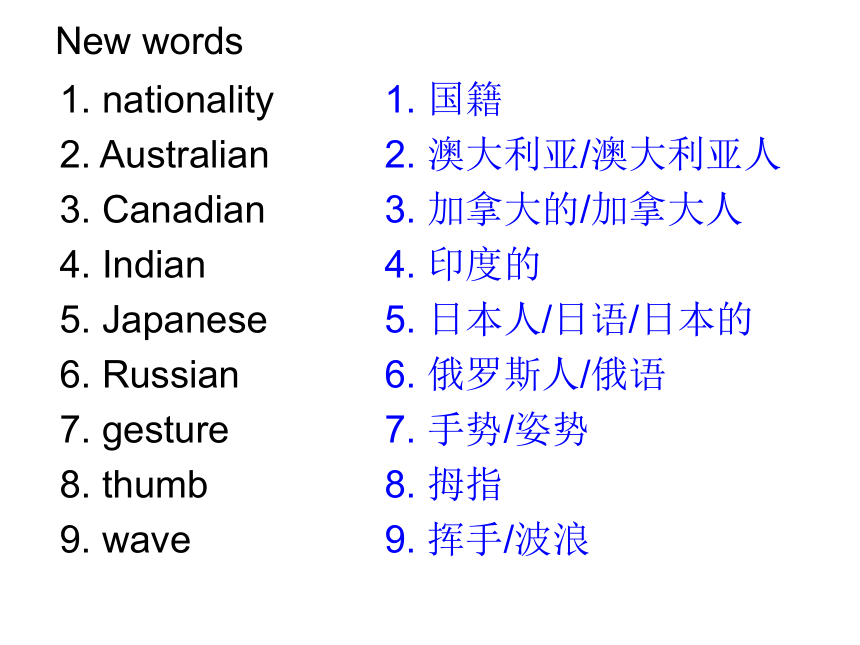
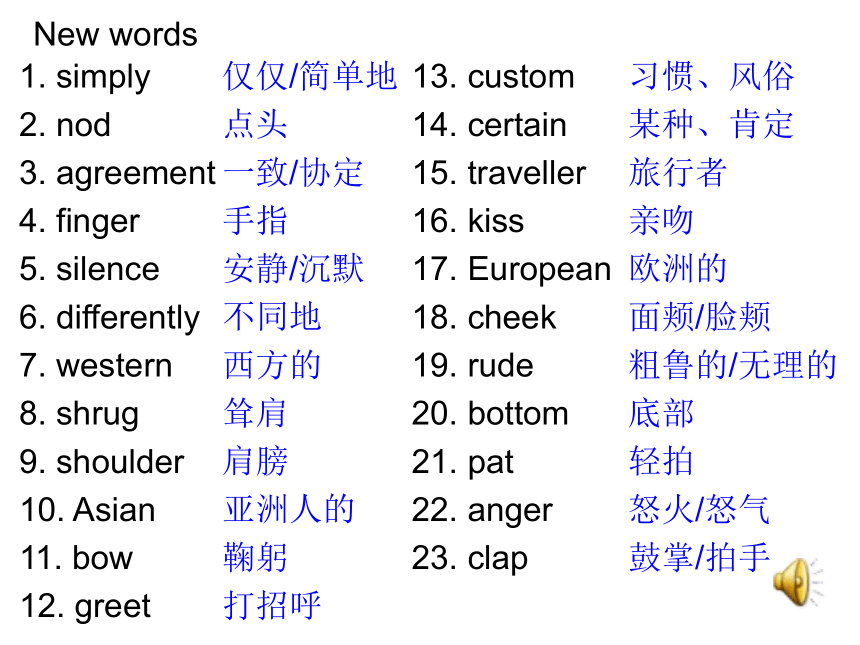

文档简介
课件71张PPT。Welcome back to School Now you are a third year student in the middle school ! 进入初三你做好准备了吗心理,思想上的准备:
1面临挑战你会___.
2面对困难时,你会___.
3面对挫折和失败,你会_______.
4面对父母的期望、家庭责任时,你会________ 奋力拼搏迎难而上永不放弃勇于面对和敢于承担Let’s study hard in this year,
Just for your shinning future!
Make your mind to study hard now.
“nothing is difficult if you put your heart into it.
(世上无难事,只怕有心人)” practice makes perfect.(熟能生巧) The more you practise, The better you will be.master basic knowledgekeyImprove your listening, reading and writing skillmemorize(背熟) Words and phrases over and over againOpen your mouth and recite the texts and sample writingsSome suggestions about study有计划重落实
重基础抓词汇
学语法多练习
敢于实践不怕失败
小步快走、多重复、勤复习
多听多说多读多写练能力languages1. How many languages can you speak?
2. What are they?
3. Do you know any other languages? Language New words1. 国籍
2. 澳大利亚/澳大利亚人
3. 加拿大的/加拿大人
4. 印度的
5. 日本人/日语/日本的
6. 俄罗斯人/俄语
7. 手势/姿势
8. 拇指
9. 挥手/波浪
1. nationality
2. Australian
3. Canadian
4. Indian
5. Japanese
6. Russian
7. gesture
8. thumb
9. wave
New words仅仅/简单地
点头
一致/协定
手指
安静/沉默
不同地
西方的
耸肩
肩膀
亚洲人的
鞠躬
打招呼
1. simply
2. nod
3. agreement
4. finger
5. silence
6. differently
7. western
8. shrug
9. shoulder
10. Asian
11. bow
12. greet
13. custom
14. certain
15. traveller
16. kiss
17. European
18. cheek
19. rude
20. bottom
21. pat
22. anger
23. clap习惯、风俗
某种、肯定
旅行者
亲吻
欧洲的
面颊/脸颊
粗鲁的/无理的
底部
轻拍
怒火/怒气
鼓掌/拍手shouldershrugRead as fast as you can! westerndifferentlysilencefingeragreementnodsimplywavethumbgestureRussianJapaneseIndianCanadianAustraliannationalityAsianbowgreetcustomcertaintravellerkissEuropeancheekrudebottompatangerclapRead as fast as you can! 鞠躬亚洲人,亚洲人的肩膀耸肩西方的不同的安静,沉默手指一致,协定点头仅仅,简单地挥手,波浪拇指手势,姿势俄罗斯人,俄语日本人,日本的,日语,日本人的加拿大的,加拿大人澳大利亚的,澳大利亚人国籍和…打招呼风俗,习惯某种,肯定旅行者亲吻欧洲的脸颊粗鲁的底部轻拍怒火鼓掌Read the Key Words.Key words:Nationalities / Languages
American, Australian, British, Canadian, Chinese, English, French, German, Indian, Japanese, RussianWhich are nationalities?
Which are languages?
Which are both?American, Australian, British, Canadian, Chinese, English, French, German, Indian, Japanese, RussianFrench is a nationality and also a language.Nationality:
American; Australian, British, Canadian, Indian
Both:
Chinese, English, French, German, Japanese, Russian American, Australian, British, Canadian, Chinese, English, French, German, Indian, Japanese, RussianDo you remember …?ChineseEnglishBritainJapanJapaneseFrenchFranceRussiaRussianGermanyGermanAustraliaAustralianthe USAmericanCanadaLet's discuss in pairs and then share.BNNNBBBNNBBmusictone of voicefacial expressionsHow can we communicate our ideas to others except language?How can we communicate our ideas to others except language?body languagewritten languagegestures/
sign language 1. Do you know any sigh language?
2. What gestures do you use to communicate?Free talkStop. Be silent. Bye-bye. Do you know the meanings of the following gestures?You are very good.
/ Well done! It’s OK.Say “ yes”Do you know the meanings of the following gestures?Do you know the meanings of the following facial expressions?angrysadhappytiredRead one’s mind (察言观色).One student comes to the front and shows some body languages, and the other students try to guess what he / she means.Game timeShake hands and smileHow do Chinese people greet each other?Kiss three timesHow do Russian people greet each other?Shake hands, kiss or hugHow do American people greet each other?Put hands together and nod heads.How do Indian people greet each other?Touch nosesHow do Maori people greet each other?Lesson1
Body Languagedcab一Skim the text.
What is the writer’s opinion on the importance
of body language?A. We can only use body language to communicate with people from other cultures.
B. It’s important that we learn to understand other cultures’ body language.
C. Body language is more important than the spoken language.一Skim the text.
What is the writer’s opinion on the importance
of body language?A. We can only use body language to communicate with people from other cultures.
B. It’s important that we learn to understand other cultures’ body language.
C. Body language is more important than the spoken language.二. Careful readingWhat kinds of body language are mentioned in this paragraph?
And what are their meanings?Read Para. 1 and answer the question.People nod their heads to show agreement and put their fingers up to their mouths to ask for silence.2. How do people in the West show they don’t understand?
3. What do the Japanese do when they greet each other?Read Para. 2 and answer the questions.People shrug their shoulders to show they don’t understand.They bow to show respect when they greet each other.4. Are many travellers sure how to bow and when to bow while in Japan?
5. Which of the following sentences is NOT TRUE in Europe?Read Para. 3 and answer the questions.No, they aren’t.A. Women and children are kissed on each cheek by
family members in the street.
B. Friends bow when they meet in the street.
C. New friends are often greeted with a kiss on the
cheek by Europeans at parties.
D. Two men usually shake hands and put their free
hand on each other’s shoulders.6. What should you be careful about?My feet.7. What should you be careful about your
feet in the Middle East?It is very rude to show the bottom of your shoe when you rest one leg on top of the other. It is also not polite to touch people with your shoes.People can pass on information by body.
It’s common in all places to shrug their shoulders to show they don’t understand or they don’t care about something.
Japanese bow to show respect when they greet each other or say goodbye.三. Read the text again and do true or false.TFT4. When meeting new friends, people in Europe often greet with kisses on each cheek.
5. It’s not polite to show the bottom of your shoe when you rest one leg on top of the other in the Middle East.FTagreementput finger up to mouthunderstand carewestern culturesrespectAsian countriesJapankissshake hands1. pass … on to…
2. sign language
3. think about
4. around the world
5. ask for silence
6. shrug one’s shoulders
7. care about传递
手语
考虑
全世界
要求安静
耸肩
关心;在意8. take … as an example
9. shake one’s hands
10. be careful about …
11. be rude to do sth.
12. as we can see
as …as …
如:as important as…
13. in fact以……为例
握手
小心……;注意……
做某事粗鲁
正如我们所看到的
和……一样
和……一样重要
实际上/事实上传递信息
要求沉默
当心,注意
考虑
拿...做例子
在...底部
耸肩
与...交流
被用来做某事
点头
关心
亲脸
竖大拇指
交叉双肩
鞠躬表示敬意pass on information
ask for silence
be careful about
think about
take... as an example
at the bottom of
shrug one’s shoulders
communicate with
be used to do sth
nod one’s head
care about
kiss sb on the cheek
put thumbs up
cross arms
bow to show respect扩充
积累Try to say/find out these sentences.1.肢体语言在不同国家用法不同。
2.亲吻是另一个我们需要学习的例子。
3.露出你的鞋底是非常粗鲁的。
4.用你的鞋去碰别人也是很没有礼貌的。
5.肢体语言就像口语一样重要。Body language is used differently in different cultures.kissing is another example that we need to learn about.It is very rude to show the bottom of your shoes.It is also not polite to touch people with your shoes.Body language is just as important as spoken language.anadianndianussianhineseustralianrench1. It is important to have respect for different cultures.
2. It is useful to learn certain types of local body language when you travel.
3. It is rude to show the bottom of your shoes in some places.
4. In Asian countries, people don't kiss on the cheek when they meet.
5. In western cultures, people don't bow when they say goodbye.
6. Body language is an important way of communication.
7. She nodded her head to show agreement.
8. He raised his hand to show he wanted to speak.JapanEastJapanesebowAsiaculturesillyespeciallyEuropeansShare passive voice sentences
that you find out from the text. isaream行为者 are made is written are invited is givenA lot of postcards are bought by tourists.takendoneThe breakfast is made by….WellwingoodbyecareDBAC?? shaking hands: You should shake hands with others with a smile. At the same time you shouldn’t wear hats or gloves when you do this. Usually, the time of shaking hands should last no more than 3 seconds. It is polite to wait for the ladies, the leaders or the old to show their hands first, then you can shake with them.CULTURE bow: When you bow to others, you should stand at attention and take off your hat to show your respect.
kiss: If you meet a friend or your relative, you can greet him or her with a hug or a kiss on the cheeks. If you are a couple, you can hug and kiss, but if you are parents and children, you just kiss on the face or forehead. If you are brothers or sisters, you just kiss on the cheeks.Holland kissing each other on one cheek and then the otherThe USA shaking hands with
each otherJapan bowing to each otherMatch the country / area with its form of greeting.The NetherlandsThailandSouth Americathe Middle Eastputting their hands together and bowing slightlykissing each other on one cheek and then the othergreeting each other by touching noseshugging each other1. … or they don’t care about something. care about
We Chinese should care about our country.
我们中国人应当关心我们的国家。
It makes me feel very happy that you care about me.
你关心我,我感到很高兴。 care for
I really care for the new dress.
我真得很喜欢这件新裙子。
He spent years caring for his sick mother.
数年间,他一直在照顾生病的母亲。关心;在意照顾;喜欢 It is + adj. to do sth.
it 是形式主语,to do sth.是真正的主语。
It is interesting to play computer games.
玩电脑很有趣。2. It is very rude to show the bottom of your show … 1. —— It is very important _____ make a plan before a new term.
— Yes. You must try to make it carefully.
A. of B. for C. toC干某事是……, 2. _______ is important to help others.
A. It B. That C. This D. We
3. Is ______ possible to fly to the moon in a spaceship?
now B. man C. that D. it
4. 对我们来说学好英语是非常重要的。(It is … for sb. to do …)
_________________________________
________________________________It is very important for us to learn English well. 3. … is just as important as the spoken language … as +adj. / adv.(原级) + as
表示不同人或物同一性质的比较,意为“……和……一样……”。
The tree is as _____ as the building (is).
这棵树和那栋楼一样高。
He runs as _____ as I.
他和我跑得一样快。tallfast( ) 1. I play basketball every day because I want to play as ______ as Yao Ming. (2012湖南株洲)
A. well B. better C. bestA ( ) 2. The volunteer spoke as _______ as she could to make the visitors understand her. (2013上海)
A. clearly B. more clearly
C. most clearly D. the most clearlyA句型小结 1. It is + adj. to do sth. 干某事是……, 2. as +adj. / adv.(原级) + as
“……和……一样……”。
1面临挑战你会___.
2面对困难时,你会___.
3面对挫折和失败,你会_______.
4面对父母的期望、家庭责任时,你会________ 奋力拼搏迎难而上永不放弃勇于面对和敢于承担Let’s study hard in this year,
Just for your shinning future!
Make your mind to study hard now.
“nothing is difficult if you put your heart into it.
(世上无难事,只怕有心人)” practice makes perfect.(熟能生巧) The more you practise, The better you will be.master basic knowledgekeyImprove your listening, reading and writing skillmemorize(背熟) Words and phrases over and over againOpen your mouth and recite the texts and sample writingsSome suggestions about study有计划重落实
重基础抓词汇
学语法多练习
敢于实践不怕失败
小步快走、多重复、勤复习
多听多说多读多写练能力languages1. How many languages can you speak?
2. What are they?
3. Do you know any other languages? Language New words1. 国籍
2. 澳大利亚/澳大利亚人
3. 加拿大的/加拿大人
4. 印度的
5. 日本人/日语/日本的
6. 俄罗斯人/俄语
7. 手势/姿势
8. 拇指
9. 挥手/波浪
1. nationality
2. Australian
3. Canadian
4. Indian
5. Japanese
6. Russian
7. gesture
8. thumb
9. wave
New words仅仅/简单地
点头
一致/协定
手指
安静/沉默
不同地
西方的
耸肩
肩膀
亚洲人的
鞠躬
打招呼
1. simply
2. nod
3. agreement
4. finger
5. silence
6. differently
7. western
8. shrug
9. shoulder
10. Asian
11. bow
12. greet
13. custom
14. certain
15. traveller
16. kiss
17. European
18. cheek
19. rude
20. bottom
21. pat
22. anger
23. clap习惯、风俗
某种、肯定
旅行者
亲吻
欧洲的
面颊/脸颊
粗鲁的/无理的
底部
轻拍
怒火/怒气
鼓掌/拍手shouldershrugRead as fast as you can! westerndifferentlysilencefingeragreementnodsimplywavethumbgestureRussianJapaneseIndianCanadianAustraliannationalityAsianbowgreetcustomcertaintravellerkissEuropeancheekrudebottompatangerclapRead as fast as you can! 鞠躬亚洲人,亚洲人的肩膀耸肩西方的不同的安静,沉默手指一致,协定点头仅仅,简单地挥手,波浪拇指手势,姿势俄罗斯人,俄语日本人,日本的,日语,日本人的加拿大的,加拿大人澳大利亚的,澳大利亚人国籍和…打招呼风俗,习惯某种,肯定旅行者亲吻欧洲的脸颊粗鲁的底部轻拍怒火鼓掌Read the Key Words.Key words:Nationalities / Languages
American, Australian, British, Canadian, Chinese, English, French, German, Indian, Japanese, RussianWhich are nationalities?
Which are languages?
Which are both?American, Australian, British, Canadian, Chinese, English, French, German, Indian, Japanese, RussianFrench is a nationality and also a language.Nationality:
American; Australian, British, Canadian, Indian
Both:
Chinese, English, French, German, Japanese, Russian American, Australian, British, Canadian, Chinese, English, French, German, Indian, Japanese, RussianDo you remember …?ChineseEnglishBritainJapanJapaneseFrenchFranceRussiaRussianGermanyGermanAustraliaAustralianthe USAmericanCanadaLet's discuss in pairs and then share.BNNNBBBNNBBmusictone of voicefacial expressionsHow can we communicate our ideas to others except language?How can we communicate our ideas to others except language?body languagewritten languagegestures/
sign language 1. Do you know any sigh language?
2. What gestures do you use to communicate?Free talkStop. Be silent. Bye-bye. Do you know the meanings of the following gestures?You are very good.
/ Well done! It’s OK.Say “ yes”Do you know the meanings of the following gestures?Do you know the meanings of the following facial expressions?angrysadhappytiredRead one’s mind (察言观色).One student comes to the front and shows some body languages, and the other students try to guess what he / she means.Game timeShake hands and smileHow do Chinese people greet each other?Kiss three timesHow do Russian people greet each other?Shake hands, kiss or hugHow do American people greet each other?Put hands together and nod heads.How do Indian people greet each other?Touch nosesHow do Maori people greet each other?Lesson1
Body Languagedcab一Skim the text.
What is the writer’s opinion on the importance
of body language?A. We can only use body language to communicate with people from other cultures.
B. It’s important that we learn to understand other cultures’ body language.
C. Body language is more important than the spoken language.一Skim the text.
What is the writer’s opinion on the importance
of body language?A. We can only use body language to communicate with people from other cultures.
B. It’s important that we learn to understand other cultures’ body language.
C. Body language is more important than the spoken language.二. Careful readingWhat kinds of body language are mentioned in this paragraph?
And what are their meanings?Read Para. 1 and answer the question.People nod their heads to show agreement and put their fingers up to their mouths to ask for silence.2. How do people in the West show they don’t understand?
3. What do the Japanese do when they greet each other?Read Para. 2 and answer the questions.People shrug their shoulders to show they don’t understand.They bow to show respect when they greet each other.4. Are many travellers sure how to bow and when to bow while in Japan?
5. Which of the following sentences is NOT TRUE in Europe?Read Para. 3 and answer the questions.No, they aren’t.A. Women and children are kissed on each cheek by
family members in the street.
B. Friends bow when they meet in the street.
C. New friends are often greeted with a kiss on the
cheek by Europeans at parties.
D. Two men usually shake hands and put their free
hand on each other’s shoulders.6. What should you be careful about?My feet.7. What should you be careful about your
feet in the Middle East?It is very rude to show the bottom of your shoe when you rest one leg on top of the other. It is also not polite to touch people with your shoes.People can pass on information by body.
It’s common in all places to shrug their shoulders to show they don’t understand or they don’t care about something.
Japanese bow to show respect when they greet each other or say goodbye.三. Read the text again and do true or false.TFT4. When meeting new friends, people in Europe often greet with kisses on each cheek.
5. It’s not polite to show the bottom of your shoe when you rest one leg on top of the other in the Middle East.FTagreementput finger up to mouthunderstand carewestern culturesrespectAsian countriesJapankissshake hands1. pass … on to…
2. sign language
3. think about
4. around the world
5. ask for silence
6. shrug one’s shoulders
7. care about传递
手语
考虑
全世界
要求安静
耸肩
关心;在意8. take … as an example
9. shake one’s hands
10. be careful about …
11. be rude to do sth.
12. as we can see
as …as …
如:as important as…
13. in fact以……为例
握手
小心……;注意……
做某事粗鲁
正如我们所看到的
和……一样
和……一样重要
实际上/事实上传递信息
要求沉默
当心,注意
考虑
拿...做例子
在...底部
耸肩
与...交流
被用来做某事
点头
关心
亲脸
竖大拇指
交叉双肩
鞠躬表示敬意pass on information
ask for silence
be careful about
think about
take... as an example
at the bottom of
shrug one’s shoulders
communicate with
be used to do sth
nod one’s head
care about
kiss sb on the cheek
put thumbs up
cross arms
bow to show respect扩充
积累Try to say/find out these sentences.1.肢体语言在不同国家用法不同。
2.亲吻是另一个我们需要学习的例子。
3.露出你的鞋底是非常粗鲁的。
4.用你的鞋去碰别人也是很没有礼貌的。
5.肢体语言就像口语一样重要。Body language is used differently in different cultures.kissing is another example that we need to learn about.It is very rude to show the bottom of your shoes.It is also not polite to touch people with your shoes.Body language is just as important as spoken language.anadianndianussianhineseustralianrench1. It is important to have respect for different cultures.
2. It is useful to learn certain types of local body language when you travel.
3. It is rude to show the bottom of your shoes in some places.
4. In Asian countries, people don't kiss on the cheek when they meet.
5. In western cultures, people don't bow when they say goodbye.
6. Body language is an important way of communication.
7. She nodded her head to show agreement.
8. He raised his hand to show he wanted to speak.JapanEastJapanesebowAsiaculturesillyespeciallyEuropeansShare passive voice sentences
that you find out from the text. isaream行为者 are made is written are invited is givenA lot of postcards are bought by tourists.takendoneThe breakfast is made by….WellwingoodbyecareDBAC?? shaking hands: You should shake hands with others with a smile. At the same time you shouldn’t wear hats or gloves when you do this. Usually, the time of shaking hands should last no more than 3 seconds. It is polite to wait for the ladies, the leaders or the old to show their hands first, then you can shake with them.CULTURE bow: When you bow to others, you should stand at attention and take off your hat to show your respect.
kiss: If you meet a friend or your relative, you can greet him or her with a hug or a kiss on the cheeks. If you are a couple, you can hug and kiss, but if you are parents and children, you just kiss on the face or forehead. If you are brothers or sisters, you just kiss on the cheeks.Holland kissing each other on one cheek and then the otherThe USA shaking hands with
each otherJapan bowing to each otherMatch the country / area with its form of greeting.The NetherlandsThailandSouth Americathe Middle Eastputting their hands together and bowing slightlykissing each other on one cheek and then the othergreeting each other by touching noseshugging each other1. … or they don’t care about something. care about
We Chinese should care about our country.
我们中国人应当关心我们的国家。
It makes me feel very happy that you care about me.
你关心我,我感到很高兴。 care for
I really care for the new dress.
我真得很喜欢这件新裙子。
He spent years caring for his sick mother.
数年间,他一直在照顾生病的母亲。关心;在意照顾;喜欢 It is + adj. to do sth.
it 是形式主语,to do sth.是真正的主语。
It is interesting to play computer games.
玩电脑很有趣。2. It is very rude to show the bottom of your show … 1. —— It is very important _____ make a plan before a new term.
— Yes. You must try to make it carefully.
A. of B. for C. toC干某事是……, 2. _______ is important to help others.
A. It B. That C. This D. We
3. Is ______ possible to fly to the moon in a spaceship?
now B. man C. that D. it
4. 对我们来说学好英语是非常重要的。(It is … for sb. to do …)
_________________________________
________________________________It is very important for us to learn English well. 3. … is just as important as the spoken language … as +adj. / adv.(原级) + as
表示不同人或物同一性质的比较,意为“……和……一样……”。
The tree is as _____ as the building (is).
这棵树和那栋楼一样高。
He runs as _____ as I.
他和我跑得一样快。tallfast( ) 1. I play basketball every day because I want to play as ______ as Yao Ming. (2012湖南株洲)
A. well B. better C. bestA ( ) 2. The volunteer spoke as _______ as she could to make the visitors understand her. (2013上海)
A. clearly B. more clearly
C. most clearly D. the most clearlyA句型小结 1. It is + adj. to do sth. 干某事是……, 2. as +adj. / adv.(原级) + as
“……和……一样……”。
同课章节目录
- Unit 1 Language
- Lesson 1 Body Language
- Lesson 2 Different Kinds of Language
- Lesson 3 Language Learning Tips
- Communication Workshop
- Unit 2 Books
- Lesson 4 Classics
- Lesson 5 The Book Club
- Lesson 6 Tom Sawye
- Communication Workshop
- Unit 3 Creativity
- Lesson 7 A Famous Invento
- Lesson 8 Good or Bad?
- Lesson 9 Creative Minds
- Communication Workshop
- Unit 4 Space
- Lesson 10 Life in Space
- Lesson 11 The Amazing Shenzhou
- Lesson 12 The Spaceship
- Communication Workshop
- Unit 5 Literature
- Lesson 13 Anne of Green Gables
- Lesson 14 The Dark Room
- Lesson 15 A Famous Write
- Communication Workshop
- Unit 6 Role Models
- Lesson 16 Yao Ming
- Lesson 17 People in Our Lives
- Lesson 18 Steve Jobs
- Communication Workshop
- Unit 7 Journeys
- Lesson 19 The Silk Road
- Lesson 20 Life in a Journey
- Lesson 21 To the South Pole
- Communication Workshop
- Unit 8 Discoveries
- Lesson 22 Famous Discoveries
- Lesson 23 Discovery of the Yea
- Lesson 24 An Experiment Report
- Communication Workshop
- Unit 9 Save the Planet
- Lesson 25 Going Green
- Lesson 26 Our Rive
- Lesson 27 Tree Heroes
- Communication Workshop
